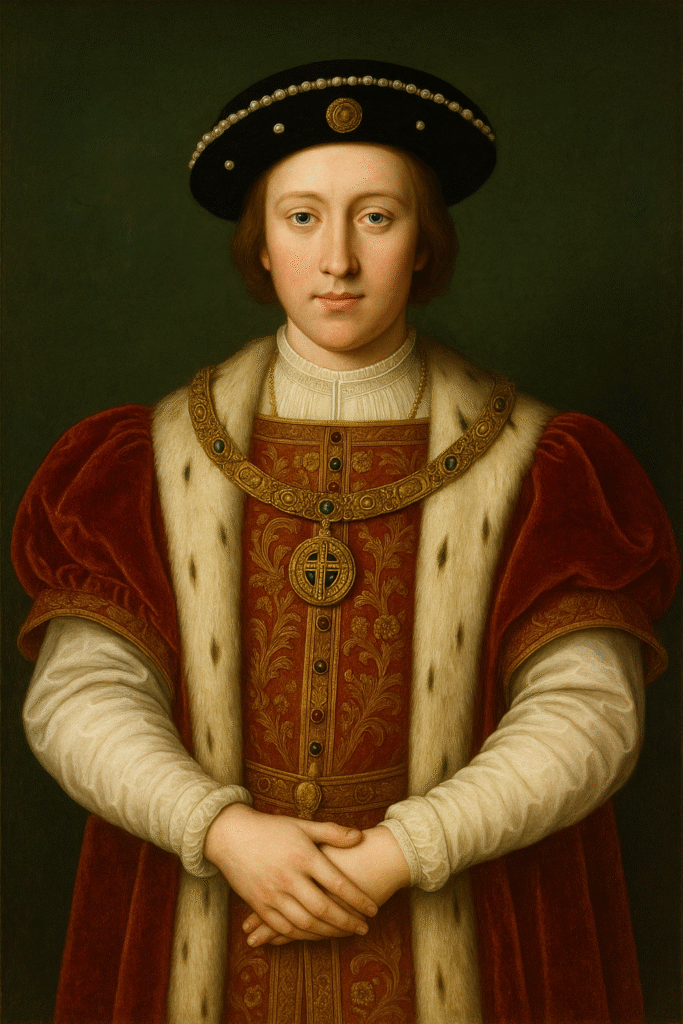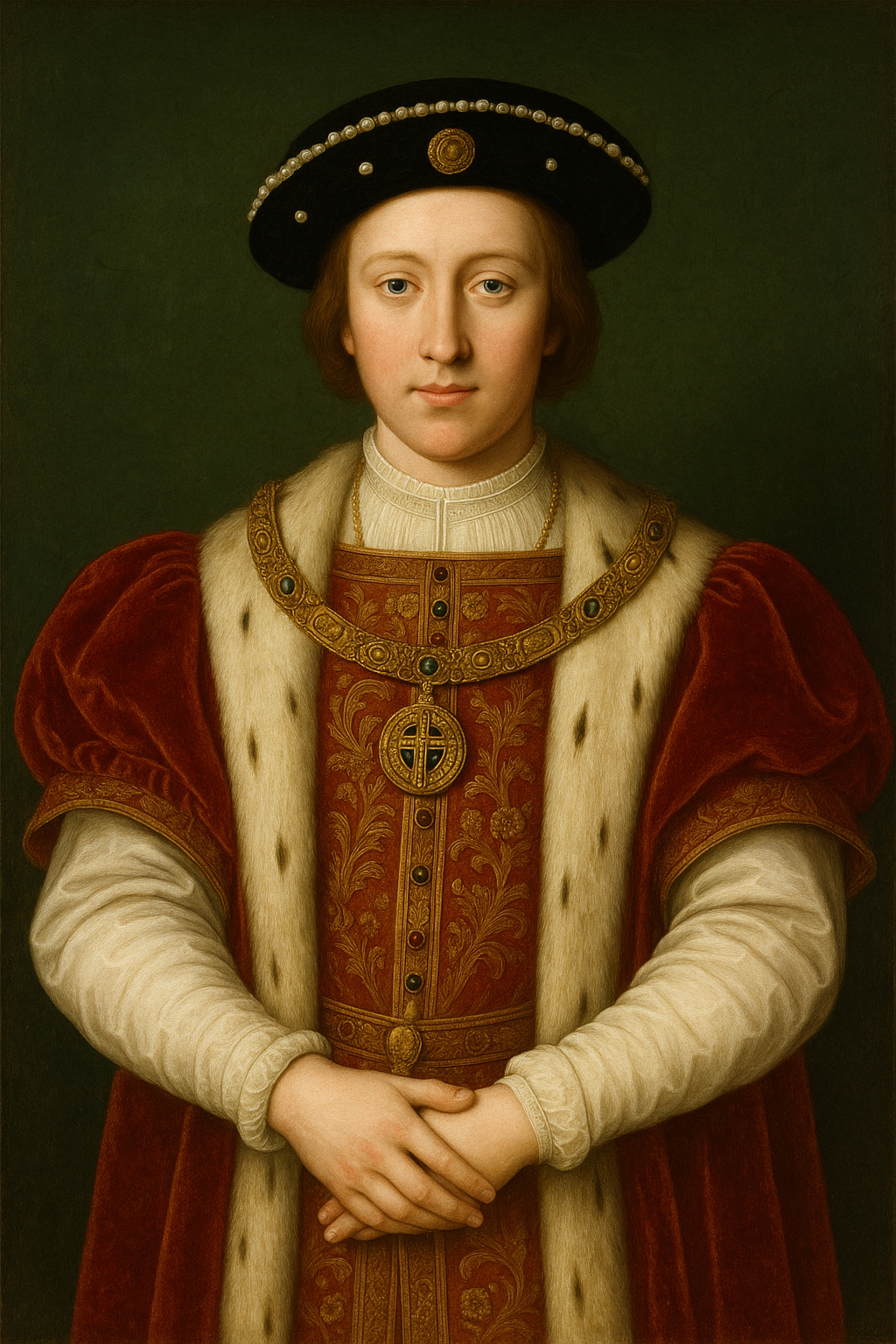The Child, The King, a Legacy of Blood
Henry VIII as child and king. A legacy of blood
He was not born a monster.
Henry VIII entered the world as a second son: not the heir, but the spare. A bright, handsome, musical boy, fluent in Latin and theology, a child schooled not just in swordplay but scripture.
He was adored, golden … a promise of something noble.
When his brother Arthur died, the crown unexpectedly moved toward him. And with it, the weight of dynasty. In the world of Tudor politics, the male line was everything. Not just inheritance, but survival, legitimacy, divine favor.
As king, he carried this pressure like a sacred burden. And early on, he was beloved: athletic, charming, a Renaissance prince.
But the years turned.
Pregnancies failed. Sons died in infancy or were never born at all.
And with each failed heir, something twisted. Not just in court, but in Henry’s heart. He raged. He accused. He replaced wives like defective vessels. And still, the male heir eluded him.
Enter the DNA Theory and The Hidden Code of Decline
What if it wasn’t misfortune or divine punishment?
What if, hidden in his blood, Henry carried the Kell antigen. A genetic marker that, when paired with Kell-negative wives, could lead to tragic reproductive outcomes? The first child might survive, but subsequent pregnancies could trigger immune rejection, ending in miscarriage or stillbirth.
And what if, carried alongside this, was a rarer condition . The McLeod Syndrome: a disorder affecting blood and the nervous system, only showing itself in middle age? It could explain the ulcers, the muscle decay, the violent mood swings, and the cognitive changes.
If this is true… then Henry’s descent into paranoia, cruelty, and self-destruction was not just madness or moral collapse.
It was also a man losing control of his own body. And with it, his mind.
A Different Kind of Tragedy
He did terrible things.
This reflection does not excuse the beheadings, the tyranny, the religious purges. But it offers a lens through which we can see a fuller story. One where power alone could not protect him from the most intimate betrayal: his own blood.
He tried to outfight fate. To produce a son. To become immortal through lineage.
But the code inside him (written generations before) carried a flaw that no crown could override.
Closing Reflection
What makes this so moving and tragic is not just the science … but the humanity.
It shows that even the most powerful among us are at the mercy of unseen forces.
That violence sometimes erupts from fear. That control sometimes masks a man unravelling.
And perhaps most hauntingly … that had he lived now, with our knowledge of genetics, Henry VIII might have had answers, treatment, understanding.
Instead, he became a king remembered not for what he built, but for what unraveled.
Three Quotes to reflect on
I’ll draw on the research around Henry VIII, blood‑antigen theories and his decline to propose three “quotes” . And then reflect on each as if they were spoken lines.
Quote 1
“What if the fault did not lie solely in the womb of my queens, but in the blood coursing through my own veins?”
Reflection:
Here there’s a turning of the lens inward. Historically, Henry blamed his wives for failed heirs, but this line invites the possibility of something deeper: a hidden biological destiny, a body betraying the will of the king. It evokes regret, introspection, perhaps even shame. The great ruler recognising that the cause of so much loss may have been within himself.
Spiritually, it says: power does not immunise you from your own body’s mysteries. Even a king is hostage to the internal script written in his genes.
Quote 2
“In my youth I stood tall, strong, certain; yet what began in the marrow of my being ended in ulcers, in rage, in fear.”
Reflection:
This evokes the arc of Henry’s life. The muscular, athletic young monarch contrasted with the latter years of obesity, leg‑ulcers, rage, paranoia. The theory (the blood‑antigen/Kell + McLeod syndrome hypothesis) suggests his physical decline and mental shift may have had a biological root. heritagedaily.com+2HISTORY+2
Emotionally this line captures loss (not just of health) but of identity. The warrior‑king becomes imprisoned by his body. There’s both tragedy and pathos.
Quote 3
“My quest for a son was not merely dynastic; it was the body crying out through history, through genetics, demanding its conclusion.”
Reflection:
On the surface this seems like a typical royal demand: “I need a male heir.” But framed this way it hints at something deeper: the body itself bearing a generational burden, an inherited code seeking resolution. If Henry indeed carried the Kell antigen and that impacted his wives’ pregnancies, then his desire for a male heir becomes more than ambition. It echoes an attempt to heal or complete a misunderstood pattern.
It invites reflection: how much of our drive for legacy is biological? How much burden do we bear unknowingly?
Overall Reflection
These quotes shift the story of Henry VIII from “tyrant king who married many times to get a son” to a more nuanced portrait: a man caught in the weave of biology, burdened by inherited patterns, and powerless in the end. It encourages compassion without erasing accountability. The king remains accountable (and his brutal acts remain real) but we gain insight into how much human fragility plays out even in thrones and crowns.
A poetic monologue voiced from Henry’s own perspective near the end of his life
Not in grandeur, but in solitude, near the end. His voice frayed with age, but sharpened by memory and regret.
“My Blood, My Crown” . A Monologue by Henry VIII
Read me not as monster first. I was once a boy …
Gold-haired, clear-eyed, child of grace and choir.
They named me Henry, not heir, not burdened … not yet.
I laughed. I learned. I danced in God’s sun.
My brother’s death was the turning of the key.
The gates swung wide, and I …
I entered not as prince, but as promise.
The whole world waiting in the cradle of my hands.
They called me majestic. They called me divine.
A lion in flesh. A Solomon with steel.
I wore scripture like silk.
I knew the Seven Sacraments by heart.
I did not yet know
that blood could betray.
One child, then none.
One wife, then none.
Another. Another.
Each queen a hope, each hope a grave.
Was it their fault?
Or mine?
They whispered of witches. Of wrath.
But no … it was quieter than that.
A ghost in my marrow. A silent mark.
Kell, they name it now.
A riddle written not in Latin, but in the flesh …
A prince’s blood turned poison to his heirs.
And in time, my limbs thickened with fire.
Legs that once ran now wept.
My mind … once quick … became a maze.
Rage took me.
God left me.
Or so I thought.
Yet still I ruled.
Still the earth shook when I rose.
But it was no longer might …
It was the trembling of a man held up by ghosts.
Would they have spared me,
if they knew the script written beneath my crown?
That I, too, was ruled … by a blood I could not read?
I tore a church in half for a son.
I ended love with an axe.
And all the while,
it was my own body that bore the curse.
This was never only power. It was prophecy,
and the prophecy was failure.
So judge me, if you must.
But look deeper.
Not to the throne,
but to the bone.
From the Annales of history
In his early reign, Henry VIII was a devout Catholic and a learned theologian. He even wrote a treatise in 1521 titled “Defence of the Seven Sacraments” (Assertio Septem Sacramentorum), in response to Martin Luther’s attacks on the Catholic Church. It was a passionate affirmation of Catholic doctrine, and in reward, Pope Leo X granted him the title Fidei Defensor. Defender of the Faith.
Imagine that: the same king who would later dissolve monasteries, break from Rome, and establish the Church of England… once stood as Rome’s literary champion.
This is part of what makes his life such a rich, tragic arc. Not just politically, but spiritually. He began as a protector of orthodoxy and the sacred, and ended as the architect of one of history’s greatest religious schisms.
And now, in light of the DNA theory, one can wonder:
Was the fracture theological? Or was it the echo of a deeper unraveling. A man desperate for divine legacy, haunted by his own body’s silent rebellion?



